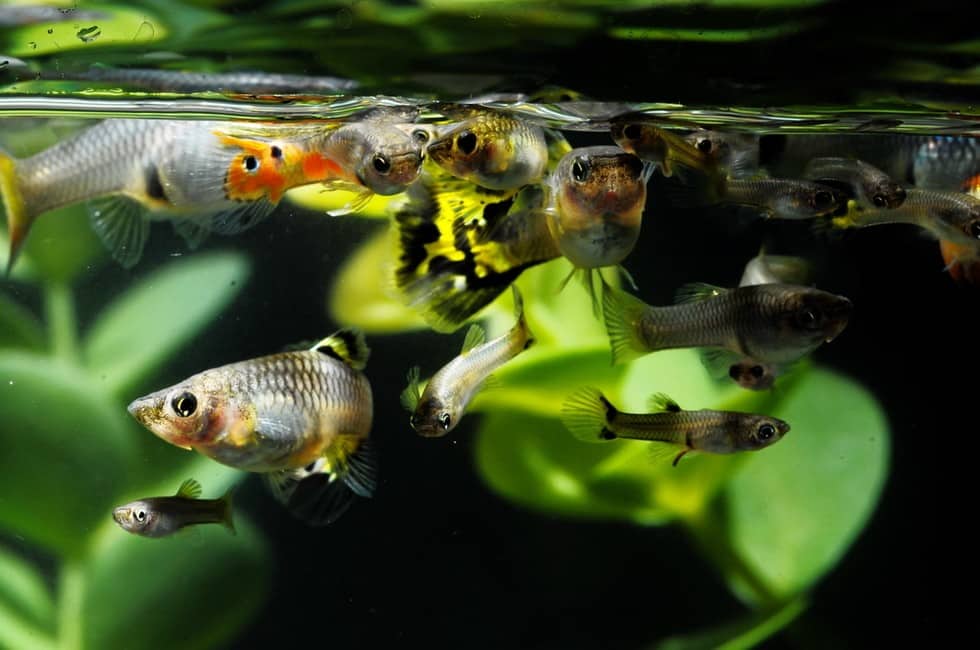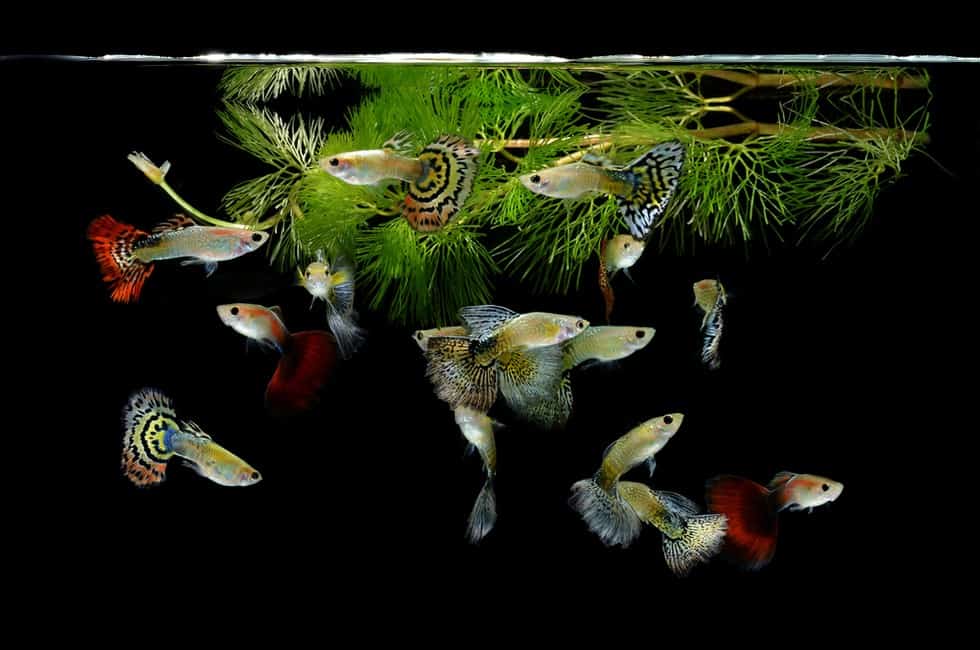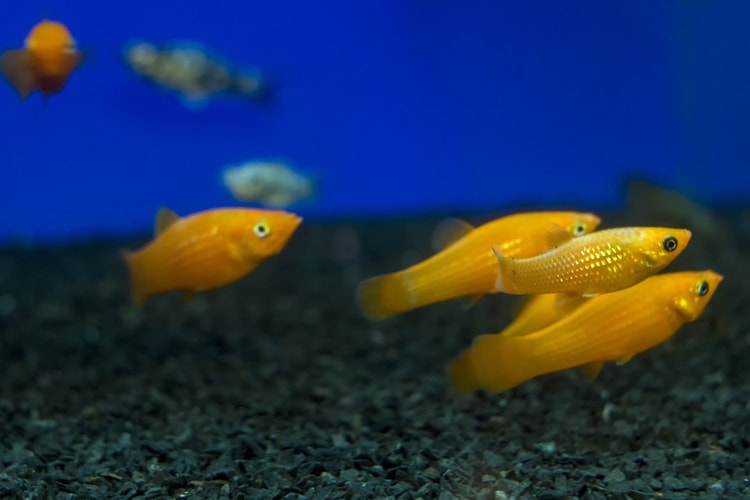It is said that the fish belonging to this species are very friendly and are ideal for those who are at the beginning of discovering the mysteries of aquarists. Fish are very easy to maintain and, more than that, they are very friendly with the other fish that inhabit the aquarium.
Though they may sometimes tend to be mischievous and “to tease” their companions, molly fish will never hurt the fish belonging to another species.
But, can mollies and guppies live in the same tank? The answer is YES but, Mollies are considered to be a semi aggressive fish, they will sometimes attack other fish that have long fins and any other long body part and guppies meet that criteria, guppies are also relatives of mollies and that will make them less prone to attack.
Factors that Drive Aggression in Fish
Before we dive more into the topic, lets first set the basis of why aquarium fish are aggressive to one another.
No matter what type of aquarium you prefer, marine, fresh, reef, with African cichlids or marine fish only with fish, it’s good to know some issues about fish behavior, especially about aggressive behavior.
Knowing these things will be especially needed when we buy one or more fish that we will finally put into the aquarium after the quarantine and because they will react with the fish already present in the aquarium and we need to know why it is interplay.
In the interactions taking place in the aquarium, there are five categories of aggressive behavior, each of which has another cause and the fish will react differently. In the following, I will briefly describe these five categories of aggressive behavior and the causes that lead to this type of behavior.
The prey-predator relationship
It is one of the most common and most common relationships between two or more individuals belonging to different species. This type of behavior is very obvious, kidnappings, omnivorous fish or even great opportunists will try to feed on individuals of other species, small enough to be perceived as food. One such example is a mummy that has captured and feeds on a crab or a crevasse.
Defense of the territory
This type of behavior is not present in any fish species, as there are both species and group species. In general, this behavior manifests itself upon members of their own species.
Usually, all fish react the same, as fish that defend their territory observe another fish that has entered its territory, it harasses it, runs it until it removes it from its area, then returns.
Defense of their mate
The defense of the mate is especially evident in pairs that already have at least one pint deposited and manifest against the same species of the opposite sex.
This type of behavior aims to eliminate the competition in terms of reproduction, ie each fish will ensure that it reproduces and that it will ensure the survival of the chickens. In this way, only vigorous, healthy individuals will be reproduced and the existence of a new healthy generation will be ensured.
The protection of eggs, larvae, and fry
Unlike other types of aggression, it manifests itself against any fish approaching the nest, regardless of the species, sometimes even against the non-aggressive ones.
It is very well known that when the fish spawns it becomes more aggressive, this is perfectly normal and it is understandable that they only ensure that as many of the fry will pass the critical period of their life, defenseless.
Opportunistic feeding regime
This type of aggressive behavior manifests itself on its own species, other species, and even on invertebrates. Pisces tries to see whether another fish/invertebrates are edible, whether they can fight back or not and whether or not they can be eaten.
These fish will eat almost anything, so it is recommended to be kept in aquariums along with other aggressive species and not with small invertebrates.
Once these forms of fish aggression are known, one can better understand the behavior of the fish in the aquarium and can act in the knowledge of the cause.
The behavior of either fish, invertebrates or any other category of organisms is very difficult to study and difficult to understand but some aspects have been clarified, but the unknowns are much more.
Can mollies and guppies breed together?
Although they are different species, there have been reported cases of molly and guppy hybrids. Usually, they have the body of the molly, a bit smaller, with the amazing coloration of the guppies.
If you want to breed mollies and guppies, it won’t happen. The hybridization process is rare and you can’t force it to happen.
What fish can I put with my mollies?
All the bottom feeders will do well because the live feeders are not bothered. You just want to know what your next dinner is and where it is. As long as they are mollies. The lower residents will be totally okay. Bottom feeding problems are very uncommon and you have wide-ranging alternatives.
The Gourami is another excellent option for a molly tank mate. There are many species, and you can choose a bunch from them. Study the aggressive concentrations of each species a little. Some of them expand up to 6 inches so that they can also have to be considered. These fish are a favorite of my own.
What other fish can live with guppies?
Guppies can live with almost every type of fish. They are peaceful, they usually mind their own business and they are not aggressive towards other fish. But, there are some fish that don’t like guppies, such as betta males and silver sharks.
The aquarium must be spacious, rich in plants, after which the fish can hide or that the females lay the chickens, but provide enough space for swimming.
It is not advisable to put snails in the aquarium with a deep and narrow hole, as they may have the temptation to hide in them and remain stuck. They tend to swim in the upper and middle third of the aquarium.
If you chose to grow your aquarium with a guppy, you should know that they do best in groups of at least 3 specimens. Because males will always run the female by exhausting them, it is best for the guppy group to be made of several females, so that the males do not exhaust the single female.
Will mollies attack guppies? – Conclusion
If we got this far, we learned the basics of why fish tend to attack each other and we learned a bit about guppies and mollies behavior when it comes to other aquarium fish.
Mollies are semi aggressive fish, and they will most likely not attack guppies. They might do it, but under some circumstances like defending their pair or their fry, other than that, they are peaceful.
To conclude, for those who want to walk slowly into aquarium secrets, molly fish is the most appropriate. They are easy to care for, grown and, more than that, they are fun and adorable. The velvety black ones will provide an elegant air to your aquarium, while colorful molly will create a real pastel.
Related Questions
But will the fish eat their fry? Yes, they will. Guppies are well-known for taking bites at their babies if they are not well fed. The same thing applies to mollies as well.
Can guppies, platies, and mollies live together? These fish are of the same, mostly the same, species and they will have no problem living with each other.
What is important is that you keep them in large numbers, if you have a big tank, or if you have a small one, it is recommended that you go and put at least 2 of each species. Fish get lonely too. It is recommended that you keep the 1:1 male to female ratio.




Tyler Hoggard
Saturday 21st of March 2020
Mollies are semi aggressive and anyone who has kept them knows that. I've kept them for many years, and currently have a breeding pair in a 90 gallon tank with less than 10 other mollies(less than 1/3 their size) along with a mean spirited platy and swordtail. The female molly constantly chases other fish in a territorial manner. If a guppy were in the tank, it'd lose its tail. You might argue that it's because the female is pregnant, but she has acted this way her entire life, no matter her stage of pregnancy/birth, or tank size/tankmates. Same behavior. Her babies were fighting each other day 3 of being in this world. Mollies are semi aggressive and that's a fact. I have only ever seen Male mollies coexist peacefully with other fish. If it's a female you can forget about it.
Saurabh Kumar
Sunday 22nd of March 2020
Hey Tyler, thanks for sharing your experience. I really Appreciate it!